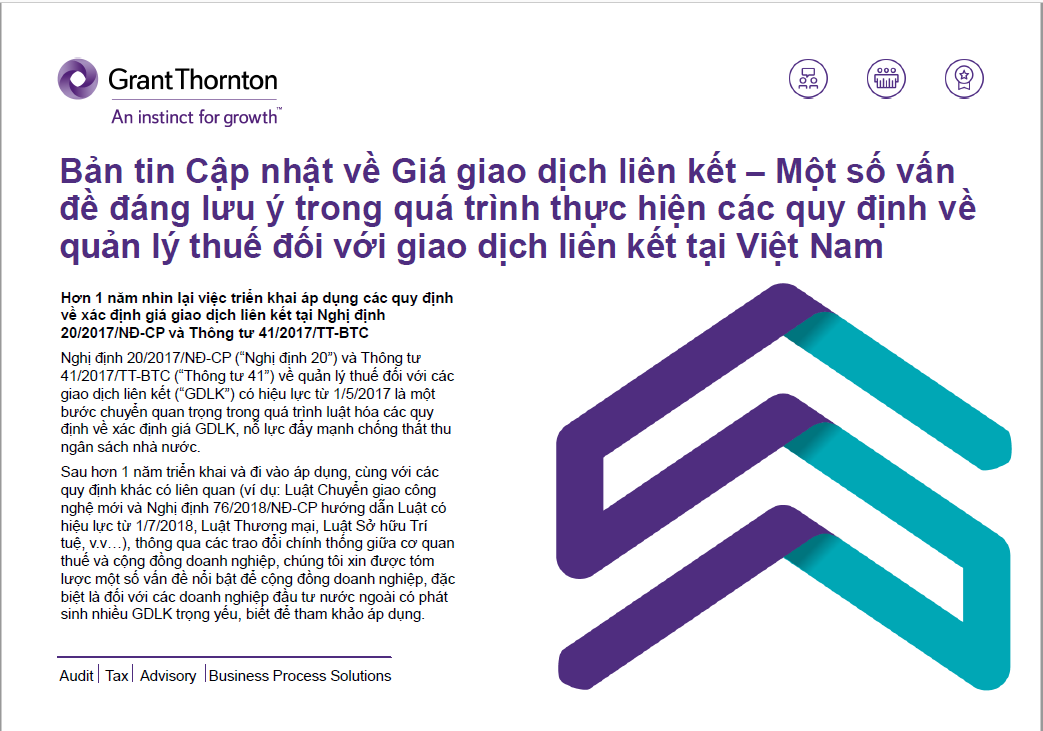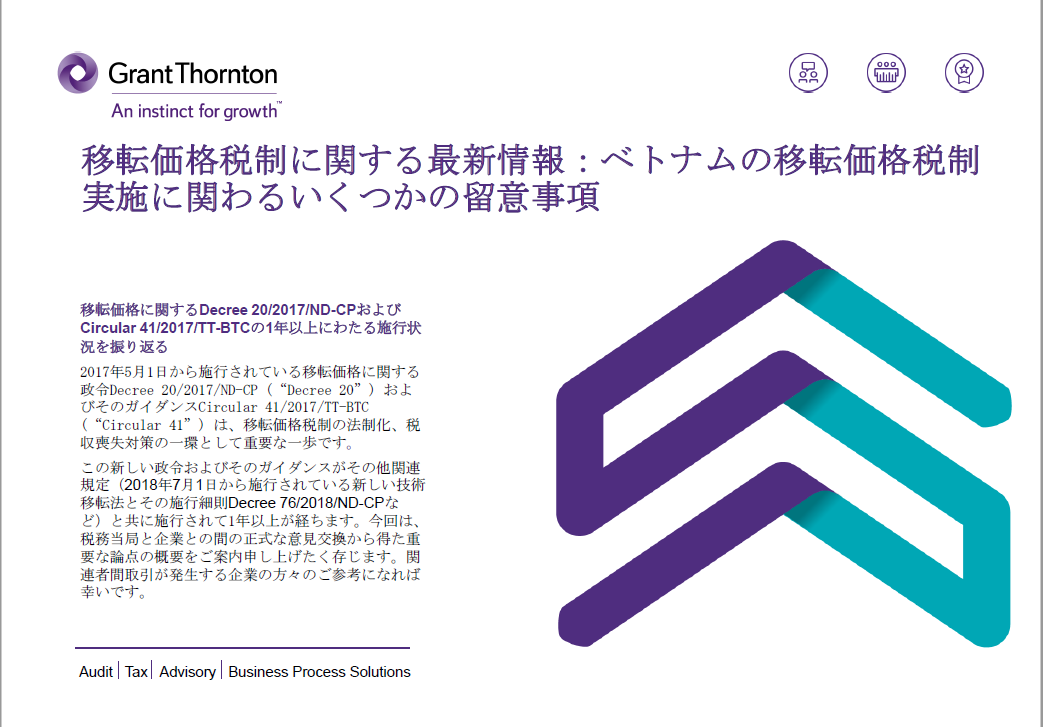-
International Financial Reporting Advisory Services
IFRS reporting advisory serivces of Grant Thornton are carried out by our dedicated team with expertise in IFRS implementation.
-
Audit Services
• Statutory audit • Review of financial statements and financial information • Agreed-upon procedures • FRAS services • Compilation of financial information • Reporting accountant • Cross-border audit • US GAAP audit
-
Audit Quality
We have various methods of monitoring our system of quality control and engagement quality, including real-time involvement of coaches and national office personnel on select audit engagements, reviews of issuer audit engagements prior to archiving by someone outside of the engagement team, and internal inspections of assurance engagements and the system of quality control.
-
Audit Approach
Audit Approach
-
Licensing services
Licensing services
-
International tax planning
Our extensive international network provides us with significant resources to meet all your expansion goals. We strive to develop commercially focused and tailored tax strategies to minimise tax exposures and maximise business efficiency.
-
Expatriate tax planning
We have a broad knowledge base and skills to assist you keep your personal income taxes to a legitimate and reasonable level, while remaining compliant with legislation. We can develop a personalised package for each key employee to take maximum advantage of the exemptions and incentives available.
-
Tax advisory
We will review the proposed business model and transactions and advise on tax implications and recommendations to optimize the tax opportunities under the local regulations and treaties which Vietnam entered into. Furthermore, we coordinate with our GT global tax team to provide a comprehensive tax advisory for the countries involved in the business model and transactions.
-
Tax compliance services
This service is designed to assist enterprises to cope with the statutory tax declaration requirements in line with the Vietnamese tax laws as well as the frequent changes and updates in tax laws.
-
Tax health check
Our Tax Health Check involves a high-level review of specific tax areas to highlight the key issues that need to be rectified in order to reduce tax risks. Through our extensive experience, we have identified key risk areas in which many enterprises are not fully compliant or often overlook potential tax planning opportunities. Our tax health check service represents a cost-effective method to proactively manage risks and reduce potential issues arising as a result of a tax inspection.
-
Transfer Pricing
Transfer pricing is a pervasive tax issue among multinational companies. In Vietnam, the tax authorities require special documentation to report related party transactions. Compliance with transfer pricing regulations is an important aspect of doing business effectively in Vietnam as failure to do so may result in significant penalties.
-
Tax due diligence
We conduct tax due diligence reviews of target companies to analyse their tax exposure and position in relation to acquisitions, mergers or consolidations. We are able to integrate this service with our Advisory Services department in order to offer a comprehensive, holistic due diligence review.
-
Customs and international trade
Our experienced professionals can help you manage customs issues more effectively through valuation planning and making use of available free trade agreements. We also assist Clients in optimising their customs procedures by making use of potential duty exemptions and efficient import-export structures. Risk mitigation activities include customs audit defense and compliance reviews.
-
M&A Transaction
We advise numerous foreign investors on efficient tax structures for their investments. Our experience allows you to consider all the options and set up a corporate structure that meets both operational and tax efficiency requirements. In short, the structure that is best for you.
-
Industrial Zones – Picking A Location For Your Business
Grant Thornton Vietnam’s one-stop services are designed to provide comprehensive support to both new and current investors who are planning to expand or restructure their business in Vietnam. Our professionals have established strong working relationships with landlords, property developers and authorities at various localities. With extensive experiences in liaison with the relevant agencies, we offer assistance including negotiation on land rental rates and efficient management of licensing process. Our customized and flexible solutions can bring benefits of cost efficient location, accelerate licensing process, and optimize tax opportunities while remaining in compliance with legislation.
-
Tax Audit Support
Tax audit support services provide comprehensive assistance to your business in Vietnam. Recent tax practices have shown the general tendency of launching routine tax audit on yearly basis. Tax authorities have been effectively using more sophisticated methods to identify target entities from across different industry sectors.
-
Business Risk Services
Business Risk Services
-
Transaction Advisory Services
Transaction Advisory Services
-
Valuation
Valuation
-
Business consulting services
Finance Management Advisory
-
Accounting services
Accounting services
-
Taxes compliance within outsourcing
Taxes compliance within outsourcing
-
Payroll, personal income tax and labor compliance
Payroll, personal income tax and labor compliance
-
Secondments/Loan staff services
Secondments/Loan staff services
-
Compilation of the financial and non-financial information
Compilation of the financial and non-financial information
-
Accounting systems review and improvement
Accounting systems review and improvement
-
Initial setting-up for accounting and taxes systems
Initial setting-up for accounting and taxes systems
-
Management accounting and analysis
Management accounting and analysis
-
Comprehensive ERP system solution
ERP software is a tool for business operations, production management, order processing and inventory in the business process. Today, ERP software for small and medium businesses has been greatly improved to help businesses manage their business better. The article below will answer all relevant information about what ERP software is and offer the most suitable ERP solution for businesses. Let's follow along!
-
Analyze Business Administration data
We believe in the value that data can bring to the success and development of every business. Our team helps design data architecture supported by tools, to support business governance and provide useful information to management.
-
Financial reporting compliance solution package
Putting financial issues at the heart, this service helps ensure that financial reports for customers comply with both the requirements of Vietnamese accounting regulations and standards (VAS) as well as reporting standards. international finance (IFRS).
-
Third-party ERP extensions
ERP is a long-term solution that requires long-term travel, not short-term. We understand that many businesses cannot deploy the entire ERP system at once due to many different reasons, instead businesses can deploy each part. Over time, these solutions can be expanded to accommodate improved business processes or can even link completely new processes across different departments.
-
Localize, deploy and rebuild the project
Quite a few ERP projects need to be implemented according to current Vietnamese requirements and regulations, but still comply with common international business requirements. These projects need some improvements and adjustments in the right direction.
-
Consulting on technology solutions
We support the selection and implementation of the most suitable solutions, ensuring business efficiency and performance. We will work closely with customers to plan, evaluate and implement the right technology investment strategies and solutions to meet the development needs of businesses.

-
Offshore company establishment service
Using the offshore company model will facilitate the owner in the process of transaction and expand overseas markets, take advantage of the tax policy with many incentives and protect the value of the family enterprise's assets.
-
Private Trust Advisory
The development of the economy with many modern financial instruments has brought many advantages and opportunities for the enterprises, but there are still certain potential risks in any type of business. So how to protect your asset value with an appropriate company structure while stay compliance with relevant regulations?
-
Our values
We have six CLEARR values that underpin our culture and are embedded in everything we do.
-
Learning & development
At Grant Thornton we believe learning and development opportunities help to unlock your potential for growth, allowing you to be at your best every day. And when you are at your best, we are the best at serving our clients
-
Global talent mobility
One of the biggest attractions of a career with Grant Thornton is the opportunity to work on cross-border projects all over the world.
-
Diversity
Diversity helps us meet the demands of a changing world. We value the fact that our people come from all walks of life and that this diversity of experience and perspective makes our organisation stronger as a result.
-
Contact us
Contact us
-
Available positions
Experienced hires
-
Available positions
Available positions
Having a look back after more than one year of implementation of Transfer Pricing regulations stipulated in Decree 20/2017/ND-CP and Circular 41/2017/TT-BTC.
Decree 20/2017/ND-CP (“Decree 20”) and Circular 41/2017/TT-BTC (“Circular 41”) on tax administration for related party transactions (“RPTs”) with effective from 1 May 2017 remark an important step in the process of legalizing Transfer Pricing regulations in order reduce the State budget loss.
After more than 1 year of implementation and application of Decree 20 and Circular 41 along with other relevant regulations (i.e. New Law on Technology Transfer and Decree 76/2018/ND-CP guiding the Law effective from 1 July 2018, Law on Trade, Law on Intellectual Property, etc), via observing formal discussions between tax authorities and the companies, we would like to summarize certain critical issues for the companies, especially foreign invested companies who have significant related party transactions, for reference and application.
Important notes in the process of preparation of Transfer Pricing Documentation and Transfer Pricing inspection at the companies
- Prioritize selecting internal comparable data such as gross profit margins of independent products/ groups of products (with independent revenue and cost of goods sold) for comparability analysis, where possible.
- Examine carefully the comparability factors of externally selected independent comparable (e.g. economic sector, function, geographic market, scale and ownership structure, etc.). Consider selecting domestic independent comparables for some specific industries or fields for which Vietnam has advantages (e.g. agriculture, textile, footwear, etc.)
- Consider making Transfer Pricing self-adjustments in a number of specific cases (e.g. consecutive loss of business results for many years without reasonable explanation). Making self-adjustment will bring certain benefits including avoidance of administrative penalties for incorrect declarations leading to lower tax obligations (20% of the underpaid tax) or having opportunity to enjoy incentives for the additional taxable income incurred due to the Transfer Pricing self-adjustments.
- Ensure consistency between Transfer Pricing Disclosure Forms and the information analyzed in the Transfer Pricing Documentation.
- Thoroughly examine the economic nature and supporting documents transactional basis (from Transfer Pricing as well as Corporate Income Tax perspective) instead of just focusing on the Company’s aggregated profit margins.
Issues to be considered when implementing Technology Transfer Agreements and Technical Support Agreements with related parties
- Perform a separate Benchmarking Study for the royalty fees paid to the related parties by applying Comparable Uncontrolled Price method (CUP method). This is also consistent with the provisions of the new Law on Technology Transfer whereby for cases of technology transfer between the parties in relation to the parent company - subsidiary company model or with related parties as determined by tax law, the price auditing procedure is conducted through the form of technology price valuation in accordance with the law upon tax authorities’ request.
- The economic nature of transactions (e.g. actually incurred, having supporting documents, real values brought to the transferee/receiver of technical support, not being duplicated with other transactions, capabilities of technology transferor and technical assistance providers, etc).
- Under the provisions of the new Technology Transfer Law, technology transfer from foreign countries into Vietnam is subject to regulatory registration with competent state agencies. Please note that in order to register technology transfer contracts with competent agencies, the contracts need to comply with specific provisions in the new Technology Transfer Law (and sub-law documents) effective from 1 July 2018 (such as provisions on mandatory terms, technology transfer objects, registration dossiers, etc).
- In the case of " amendments and supplements" to the signed contracts before 1 July 2018 (the effective date of the new Technology Transfer Law), the parties have the right to choose whether to register technology transfer contracts with the authority or not (except for "extension" cases).[1]
Interest expenses for companies with related party transactions
- On the issue of loan interest expenses not exceeding 20% of EBITDA for enterprises having RPTs, by the end of 2018, the General Department of Taxation has given their clear view on how to determine total deductible interest expenses upon determining corporate income tax obligations for enterprises having RPTs. Accordingly, Taxpayer’s total loan interest expenses arising within a specified tax period qualified as a deduction from income subject to corporate income tax shall not exceed 20% of total net profit generated from business activities plus loan interest costs and amortization costs (EBITDA) arising within that period, regardless of whether the loan was granted by a related party or an independent party.
- However, some current issues have not yet received final responses from the General Department of Taxation as a matter of effective period of Decree 20 in 2017, determining interest expenses to be deducted in case EBITDA is smaller than or equal to zero, etc.[2]
- In practice, performing benchmarking study for interest expenses is still unpopular in Vietnam due to the complexity of financial transactions as well as the availability of comparable information. To ensure the best compliance, enterprises should consider collecting information about independent loans if possible (for example, between enterprises and independent commercial banks or independent data from third parties) as a basis for confrontation and explanation for related parties’ interest expenses in case of being questioned by tax authorities.
The above are preliminary summaries for the companies’ information and reference. In case of specific issues, please contact the professionals at Grant Thornton for further advice.
[1] Official letter No. 3050/BKHCN-DTG dated 28 September 2018 of Ministry of Science and Technology
[2] Official letter No. 3790/TCT-DNL dated 05 October 2018 of General Tax Department





